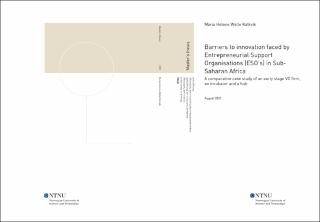| dc.contributor.advisor | Sørheim, Roger | |
| dc.contributor.author | Kalkvik, Maria Helene | |
| dc.date.accessioned | 2021-10-29T17:19:34Z | |
| dc.date.available | 2021-10-29T17:19:34Z | |
| dc.date.issued | 2021 | |
| dc.identifier | no.ntnu:inspera:85352649:85365340 | |
| dc.identifier.uri | https://hdl.handle.net/11250/2826621 | |
| dc.description.abstract | I løpet av de siste årene har det vært en dramatisk økning av oppstartsbedrifter i utviklingsland over hele verden. Forskere ser på entreprenørskap som et verktøy for å redusere fattigdom, arbeidsløshet, øke sosial velferd og økonomisk utvikling. Afrika blir nå sett på som en av de neste store nye markedsmulighetene. Inspirert av den velkjente Silicon Valley i USA, forsøker flere land å adoptere det samme entreprenørielle økosystemet gjennom å tilby “co-working” lokaler, inkubatorer, akseleratorer, hubs, mentorprogrammer, “makerspaces” og mer. Antallet av entreprenørielle støtte-organisasjonene eller ESOer, har økt raskt over hele det afrikanske kontinentet. Flere av disse ESOene er globale organisasjoner som har bestemt seg for å gå inn i det Afrikanske markedet for å støtte entreprenører. Forfatteren har her formulert tre forskningsspørsmål for å få innsikt i de nåværende utfordringene entreprenører og ESOer står ovenfor i Sub-Sahara Afrika, i tillegg til organisasjonsmodellene til ESOene og hvordan de har tilpasset seg behovene til de lokale entreprenørene.
FS1: Hva er innovasjon-barrierene som hindrer ESOer fra å hjelpe entreprenører skalere selskapene sine?
FS2: Hvordan tilpasser ESOer sine programmer til lokal kontekst?
FS3: Hva tenker ESOer som opererer på det Afrikanske kontinentet i dag, om det entreprenørielle økosystemet i endring, og økningen av andre ESOer?
For å svare på disse forskningsspørsmålene har en kvalitativ tilnærming med flere casestudier blitt utført. Forfatteren har intervjuet tre ESOer som for øyeblikket opererer i Kenya og Ghana. En analyse av intervjuene ble gjennomført, hvor funnene ble sammenlignet med eksisterende litteratur.
Funnene bekreftet eksisterende litteratur ved å dokumentere utfordringene som entreprenører møter, og som igjen påvirker ESOer sin evne til å assistere de i å lansere og skalere selskapene sine. Funnene gir ny innsikt i hvordan grunnleggere og CEOer av ESOer ser på det økende antallet ESOer i økosystemet, i tillegg til å gi eksempler på hvordan organisasjonene har tilpasset seg lokal kontekst. Forfatteren anbefaler at videre studier blir utført for å bedre forstå hvordan globale ESOer kan lykkes med å gå inn i det Afrikanske entreprenørielle økosystemet, og fasilitere entreprenører for å redusere den nåværende høye forekomsten av mislykkede oppstartsselskaper. | |
| dc.description.abstract | Over the last years, there has been a dramatic increase in startups in developing areas in the world. Researchers are looking at entrepreneurship as a tool to reduce poverty, unemployment, and increase social welfare and economic development. Africa is now considered one of the next great emerging markets. Inspired by the well known Silicon Valley in the United States, several countries are trying to adopt the same entrepreneurial ecosystem through providing co-working spaces, incubators, accelerators, hubs, mentoring, maker spaces and more. These entrepreneurial support organisations, or ESO’s, are rapidly increasing across the African continent. Several of these ESO’s are global organisations that have decided to enter the African market in order to support entrepreneurs. The author formulated three research questions in order to gain insight into the current challenges entrepreneurs and these ESO’s are facing in Sub-Saharan Africa, the organisational models of ESO’s and how they have adapted to meet the needs of local entrepreneurs.
RQ1: What are the barriers to innovation that inhibits ESO’s from helping entrepreneurs scale their businesses?
RQ2: How do global ESO’s adapt their programs to local context?
RQ3: How do ESO’s currently operating on the African continent feel about the changing ecosystem and increase of ESO’s?
In order to answer the research questions, a qualitative approach with multiple case studies has been conducted. The author interviewed three ESO’s currently operating in Kenya and Ghana. An analysis of the interviews was conducted and tied to existing literature.
The findings confirmed existing literature in documenting the challenges that entrepreneurs face, which in turn affects the ESO’s ability to assist them in launching and growing their companies. The findings provide new insight into how founders and CEOs of ESO’s view the rapid increase of these intermediaries, as well as providing examples of how the organisations adapted to fit local context. The author suggests that further studies should be conducted to better understand how global ESO’s can succeed in transitioning into the African entrepreneurial ecosystem and facilitate entrepreneurs to decrease the currently high failure rate of new ventures. | |
| dc.language | eng | |
| dc.publisher | NTNU | |
| dc.title | Barriers to innovation faced by Entrepreneurial Support Organisations (ESO’s) in Sub-Saharan Africa.
comparative case study of an early stage VC firm, an incubator and a hub. | |
| dc.type | Master thesis | |
